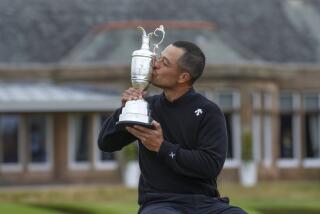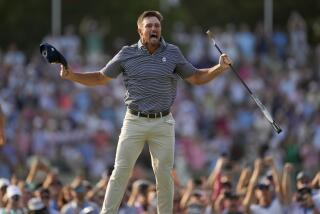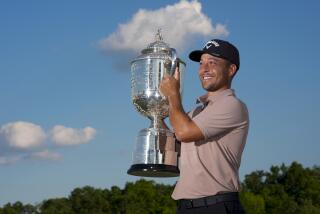Calcavecchia Wins as Stormin’ Norman Blows Off Course
- Share via
TROON, Scotland — Mark Calcavecchia, wearing a red, white and blue shirt, representing his country, virtually came out of the blue Sunday to win the 118th British Open.
Calcavecchia won on the fourth playoff hole, defeating Australians Greg Norman and Wayne Grady to become the first American to win the Open since Tom Watson in 1983.
As much as it was a stirring victory for the 29-year-old Calcavecchia, it was another crushing defeat in a major for Norman, known as the Great White Shark.
Norman was seven strokes behind Grady, the third day leader, at the outset of the final round. But he went on the attack early. He birdied the first six holes, got a bogey on the eighth hole, then tacked on three more more birdies to shoot 64, a course record at Royal Troon.
He was still in a birdie frenzy at the outset of the playoff. He birdied the first and second holes, bogeyed the third and then lost any chance for the championship when his drive and second shot on the fourth playoff hole landed in bunkers.
Norman came out of the second bunker, only to go out of bounds near the clubhouse, his comeback opportunity shattered.
Nobody was paying much attention to Calcavecchia during the regulation round. Even Norman said he was hoping for a playoff with Grady, who could have won the tournament in regulation by parring the last two holes.
But he bogeyed the 17th hole to drop to 13 under par and finished with a par at No. 18.
Calcavecchia, playing two holes ahead of Grady and paired with a fading Tom Watson, began to make his move at the 12th hole when his chip shot flew straight into the cup for a birdie.
“I was embarrassed,” Calcavecchia said of his unlikely shot. “If it hadn’t gone in, it would have gone 30 feet past the cup. All of a sudden my spirit changed.”
He also called his 40-foot par putt on the 11th hole a miracle.
Calcavecchia went on to birdie the 16th and 18th holes for a 68, and suddenly he was in a playoff against the Australians.
The playoff formula for the British Open was changed several years ago from 18-holes on Monday to four holes after the Sunday round. If the players are tied after the four rounds, the tournament goes to a sudden-death format.
The designated playoff holes were the par four first and second holes, the 223-yard par three 17th and No. 18, a par four of 452 yards.
Calcavecchia and Grady parred the first playoff hole, and Norman birdied.
On the second playoff hole, Calcavecchia’s 30-foot putt from the fringe of the green curled into the cup for a birdie. Norman followed with a birdie putt of about 15 feet and Grady parred the hole.
Calcavecchia parred the 17th hole, but Norman and Grady had bogeyes. So, Calcavecchia and Norman were one under par for the playoff after three holes, and Grady was one over.
Norman then encountered his problems with bunkers, first on a drive that prompted Calcavecchia to comment, “Greg just killed it.”
Calcavecchia drove into the rough and then hit a four iron to the green.
“It was the best shot I’ve hit,” he said. “It was so good that I didn’t care where it wound up.”
As it was, his shot landed seven feet from the cup. Grady parred the hole to remain at one over, and Norman was out of contention.
“I could have three putted and still won the Open, but I didn’t want to double hit the ball,” Calcavecchia said. “Now isn’t the time.”
Calcavecchia finished with a flourish, sinking a seven-foot birdie putt for his first major title and his third tournament victory of the year. He previously won the Phoenix and Los Angeles opens.
The win was worth 80,000 pounds, or $128,000. But Calcavecchia, generally recognized as a future superstar, wasn’t thinking of money. He was too caught up in the excitement of winning his first major in a pro career that began in 1981.
Calcavecchia said that he was undecided about playing in the British Open because his wife, Sheryl, is expecting a baby in Phoenix. “I called her after I won and she’s crying her eyes out,” Calcavecchia said. “She’s in a state of shock.”
The Australians, Norman and Grady, finished in a tie for second and Watson, bidding for a record-equaling sixth British Open victory, finished fourth after closing with a par 72.
Calcavecchia said that as much as he cherished his victory he felt badly for Norman, who shot a 64 and still lost. Moreover, Norman had 11 birdies through 20 holes Sunday on another warm afternoon at the seaside links course in Scotland.
Norman, who won the British Open in 1986, has been frustrated, in striving to win major championships.
He lost the U.S Open in 1984 in a playoff against Fuzzy Zoeller. Bob Tway made a bunker shot on the last hole to beat Norman for the PGA championship in 1986. Then, on the second playoff hole in the 1987 Masters, Larry Mize made an incredible 140-foot chip shot to heap more frustration on Norman.
Norman wasn’t gnashing his teeth in the interview room, however.
When asked why he hit a driver on the last playoff hole, Norman replied dryly: “I’ve hit a driver there every day. It’s 325 yards to that bunker. I knew the bunker was down there, but I didn’t realize that I could even reach it.”
As for his third shot from 128 yards to the green from the second bunker, Norman said it was a-make-or-break shot.
Norman, who had 1 1/2-hour wait before the playoff, said he didn’t even think about Calcavecchia until he birdied the 18th hole of the regulation round.
“Then, I went down to the practice range and hit some balls,” Norman said.
Norman said he thought he put himself out of the championships when he shot 72 Friday. His objective was to shoot a 63 Saturday.
“I was in control of my game all the way including the playoff hole,” he said. “Every shot I hit in the playoff was right off the middle of my club. Mark said he got out of jail on the 11th and 12th holes and he took advantage of his good fortune and went on to win. Destiny has a funny way of saying, ‘This is the way it’s going to be.’ ”
When asked if destiny owes him one, Norman uttered an expletive and said, “It owes me about four. Are you kidding me? You can’t win every time, but you give it a damn good try. That’s all you can do.
“I gave it my best shot, but it didn’t pay off. But I do feel good about being back in control of my game again. I’ve been absent for a while and my number one ambition now is to regain the position I had two years ago and today is a pretty good slingshot for me.
“I believe my time will come. I just have to accept that.”
Calcavecchia, recognized as an aggressive player and an exceptionally long hitter, has arrived at his time.
“Fred Couples and Payne Stewart, who are good friends of mine, told me to do it before the playoff,” Calcavecchia said. “It’s been a long time since we had a U.S. winner here. I felt I had to do it for our tour. Perhaps an American winner was overdue.”
More to Read
Go beyond the scoreboard
Get the latest on L.A.'s teams in the daily Sports Report newsletter.
You may occasionally receive promotional content from the Los Angeles Times.










